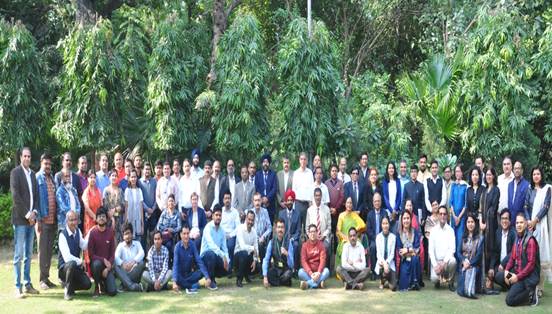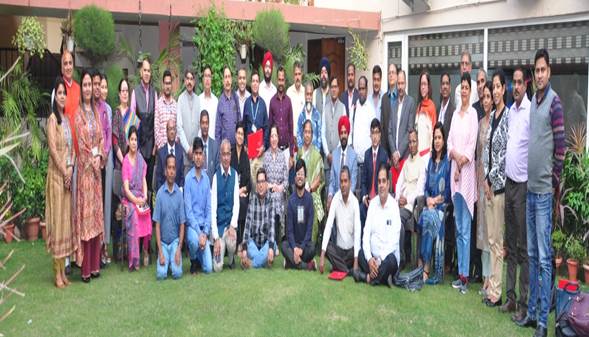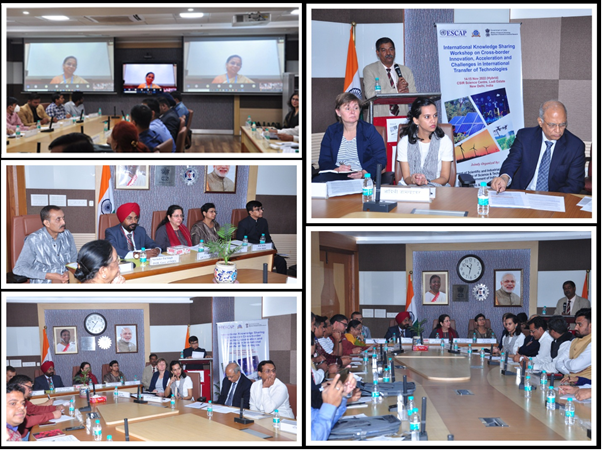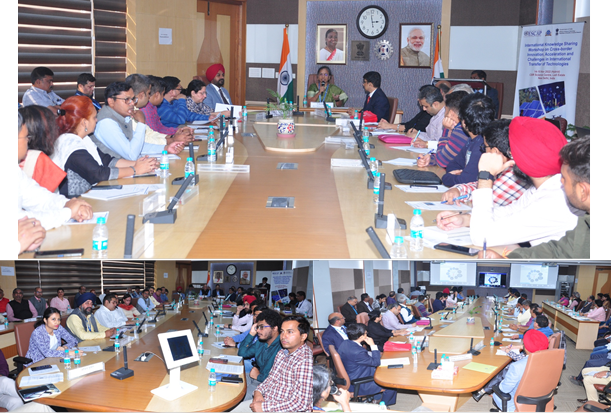DSIR, CSIR, APCTT of the UN-ESCAP jointly organised two days International Knowledge Sharing Workshop on “Cross-border Innovation, Acceleration and Challenges in International Transfer of Technologies” at CSIR Science Centre, New Delhi
An International Knowledge Sharing Workshop on “Cross-border Innovation, Acceleration and Challenges in International Transfer of Technologies”, was jointly organized by Department of Scientific & Industrial Research (DSIR), Ministry of Science & Technology, Government of India, Council of Scientific & Industrial Research (CSIR), in association with Asian and Pacific Centre for Transfer of Technology (APCTT) of the United Nations Economic and Social Commission for Asia and the Pacific (UN-ESCAP) from 14th – 15th November 2022 and coordinated by CSIR-Human Resource Development Centre (CSIR-HRDC) at CSIR Science Centre, New Delhi in Hybrid Mode. Out of around 350 participants registered for the programme 36 were international participants from 17 countries vis Bangladesh, Cambodia, Iran (Islamic Republic of), Indonesia, Jordan, Lebanon, Malaysia, Nepal, Pakistan, Philippines, Republic of Korea, Sri Lanka, Thailand, Trinidad & Tobago, Uzbekistan who joined both online & offline. Around 70 participants joined physically.

Panelists were from International Organizations including FAO, ILRI, ISA, DWIH, UKRI, RIS; Indian National Organizations like CSIR-NBRI, IITD, SPMVV, CSIR-NCL, Venture Centre, Govternmentdepartments including Office of PSA, MoE Innovation Cell, Public sectors like NRDC, excellent Industries such as International Tractors, IOCL, TATA Power Company Limited, Ankur seeds and Mahyco Pvt. Ltd.; Innovation eco-system partner like Research Parks, Incubation Centres, Start-ups, Member Country dignitaries and participants from National Organizations like NIT, Arunachal Pradesh, PRISM-TOCICS like GSBTM, CSIR-NEIST, CSIR-CSIO, CTAE, Udaipur, CSIR-NAL, IGNOU, Shiv Nadar University, University of Delhi, IITD, IIT Mandi, IIT Roorkee, IIT Indore, several Incubation Hubs, DSIR, CSIR HQ, CSIR-IIP, CSIR-NIScPR, NRDC and APCTT.
The Workshop was inaugurated online by Dr. N. Kalaiselvi, Secretary, Department of Scientific & Industrial Research (DSIR) and Director General, Council of Scientific & Industrial Research (CSIR). While delivering the inaugural address, she emphasized about the importance of technology transfer, cross border innovation and the concerted efforts of CSIR in developing the technologies and transferring them to industry. She advised the participants to develop technologies that can ultimately reach the society. In this direction she commended the Workshop where innovators, industry, R&D labs, academia, MSME, Startups, Big Industries, Incubation centres, Policy makers and other stakeholders have been brought on a common platform to discuss about the roadmap for achieving the goals under SDG 2 SDG 7 and SDG 9.

Dr. Parvinder Maini, Scientific Secretary, Office of Principal Scientific Advisor, Govt. of India; Shri Surinder Pal Singh, Joint Secretary, DSIR, Dr. Ajay Mathur, Director General, International Solar Alliances, Dr. Katja Lasch, Director, DAAD Regional Office and DWIH, New Delhi; Ms. Rebecca Fairbairn, Head of Science and Innovation, UK Research & Innovation (UKRI), UK Government; Dr. Habibar Rahman, International Livestock Research Institute (ILRI) Regional Representative, South Asia; Prof. Jamuna Duvvuru, Vice Chancellor, Sri Padmavati Mahila University, Tirupati, Dr. Bhaskar Balakrishnan, Former Ambassador of India & Science Diplomacy Fellow, Research and Information System for Developing Countries (RIS), New Delhi, Dr Preeti Soni, Head of APCTT-ESCAP, Dr Rama Swami Bansal, Head of CSIR-International S&T Affairs Directorate (ISTAD) and Dr R. K. Sinha, Head of CSIR-HRDC also graced the occasion in person.

Inaugural session of the Workshop
Dr. Parvinder Maini underscored, “Innovation is essential for boosting survival, competitiveness and market power despite being risky and prone to failure”. She gave an overview ofIndia’s policy anda few focus areas i.e. R&D expenditure from industry should increase; Foreign Direct Investment (FDI) in R&D; Increase in R&D exports; R&D by Central Public Sector Enterprises; Corporate Social Responsibility guidelines for spending in R&D, for boosting Technology transfer and start-up ecosystem.
Shri Surinder Pal Singh, Joint Secretary, DSIR told,“this workshop will provide a strong platform for APCTT Member States including India to share their needs and identify opportunities on Cross-border Innovation, possibilities on acceleration of International Collaboration and Challenges in International Transfer of Technologies
Dr. Katja Lasch, Ms. Rebecca Fairbairn and Dr. Habibar Rahman wished more fruitful collaborations to accelerate Cross-border Innovation acceleration. Prof. Jamuna Duvvuru maintained that New Education Policy of Govt. of India is an impactful step to promote more innovation and entrepreneurship in India.
This international workshop was envisaged to strengthen capacity of innovators and promote regional cooperation between innovators from India and member States of APCTT through cross-learning from experience and good practices, identifying potential collaboration opportunities and strategies for cross-border technology transfer. It Increased knowledge and awareness on the challenges, mechanisms and good practices of innovation, transfer and diffusion of technologies in the Asia-Pacific Region. It explored innovative strategies and modalities to strengthen regional cooperation for cross-border transfer and diffusion of technologies; The workshop panellists made recommendations on addressing the critical challenges for strengthening regional cooperation for innovation and technology transfer.
The workshop aimed to identify the challenges for achieving the goals in SDG 2 (Zero Hunger), SDG 7 (Affordable and Clean Energy), SDG 9 (Industry-Innovation and Infrastructure). Under the Session, “Emerging technologies for climate-resilient agriculture and animal husbandry to support SDG 2”, moderated by Dr Anand Mohit, Principal Scientist, CSIR-ISTAD, productive agriculture and animal husbandry through integrating emerging technologies like Internet of Things (IOT), robotics, drones, energy resilient preservation and biotechnology for better selection, yield improvement, disease resistance, precision farming, precision nutrient deliveries, Innovation and Policy perspectives were discussed. A constructive discussion was held particularly on smart and climate resilient agriculture, crop breeding technology for productive agriculture, precision farming, precision nutrient deliveries, animal husbandry and innovation – including Global and India’s perspectives.
Under the session, “Green and low-carbon emerging technologies in energy to support SDG 7”, Material research & innovation, production technology, power electronics, energy storage and management for alternate energy (solar, offshore, wind etc), green hydrogen, carbon-negative technologies, ocean biomass, biofuel, 5G-based smart grids, climate protection, sustainability etc. was discussed. The various challenges, research & development Innovation and policy issues concerning green & low-carbon technologies in energy sector; Green hydrogen production & storage and utilization of hydrogen as a transport fuel, blending of hydrogen in fossil fuels, smart grids, emerging Technologies like IoT, ML, CPS in power sector for energy efficiency, green energy and sustainability; power electronics such as development of various controllers (AC-DC and DC-DC) for penetrating the renewable energy and issues concerning making the existing grids resilient, etc. were also covered in the discussions.
Under the Session, “The process and key constraints in innovation, technology promotion and commercialization to support SDG 9”, deliberations on the opportunities, challenges, and guidance on how countries can accelerate the technology formulation and adoption cycles were held. Various topics on innovation ecosystem, opportunities, challenges in India, Germany and UK and Member countries of APCTT were discussed.
Finally, panel discussions on “Pathways and constraints in techno-commercial value assessment, techno-economics, marketability, and affordability of innovative technologies” was held. Various innovators from countries like Cambodia, Nepal, Uzbekistan, Thailand, India discussed about their startups as case studies. Sri Vivek Pandey, Co-founder and Chief Technology Officer, Ecozen Solutions Private Limited, Pune and Dr. Sandip Patil, Director, E-Spin Nanotech Pvt. Ltd. and Indeema Fibres Pvt. Ltd., Kanpur, the successful start-ups graduated from DSIR scheme, TePP and PRISM represented India during Panel discussion.
Dr. N. Kalaiselvi, Secretary, DSIR and Director General, CSIR, Ministry of Science and Technology, Government of India addressed the audience at the valedictory session. She discussed the outcome of the Workshop specially on critical challenges on cross border technology transfer and possible recommendation and envisioned couple of successful technology transfers/start-ups as an outcome of the Workshop in near future.

Deliberations during Day 1 and Day 2 of the workshop
The programme ended with closing remarks and brief summary of deliberations by Dr Preeti Soni, Head, APCTT-UNESCAP and Dr. Ramanuj Banerjee, Scientist F, DSIR and National Focal Point (India) for APCTT of UNESCAP, followed by Vote of Thanks to all dignitaries, panellists, speakers and participants from India and APCTT Member states, presented by Dr Vinay Kumar, Principal Scientist, CSIR-HRDC.
<><><><><><>
SNC/RR